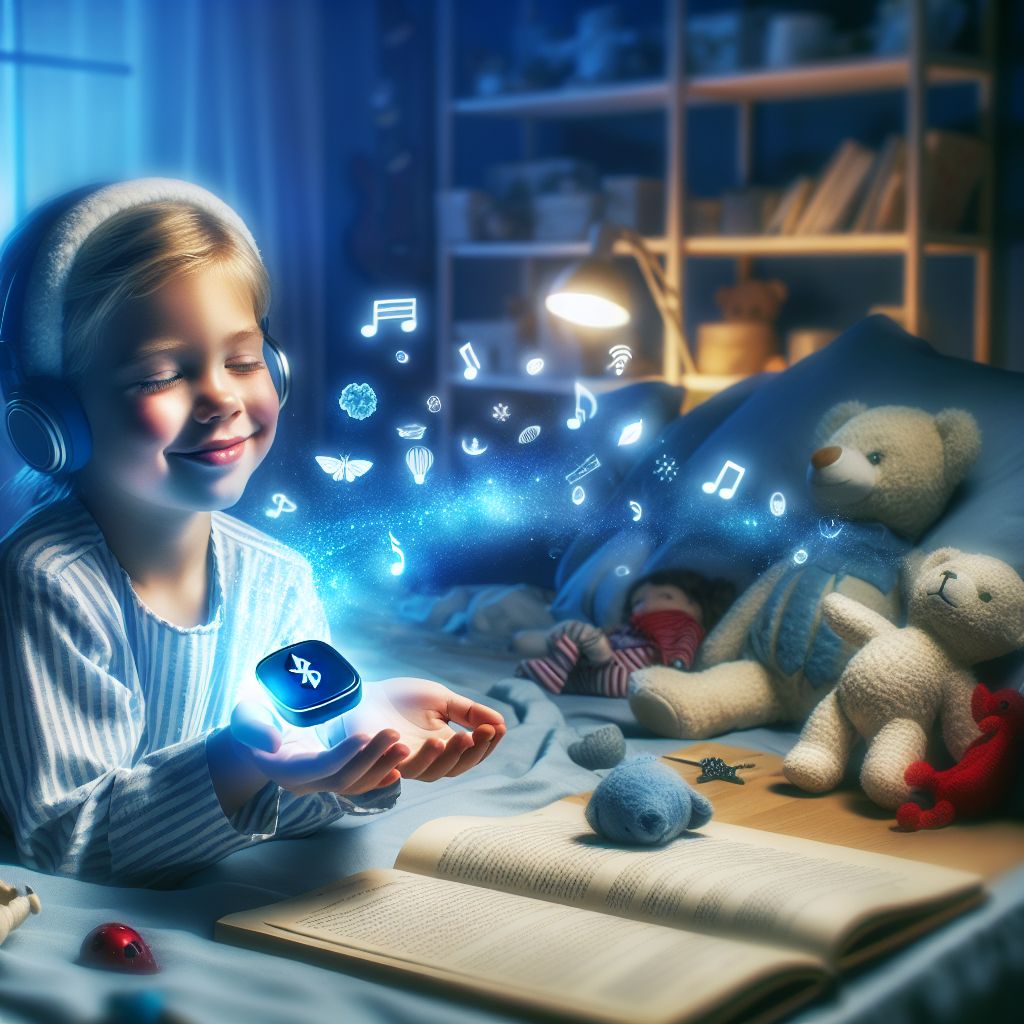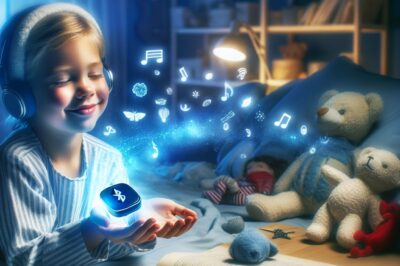Key Takeaways
-
Good sleep is essential for your child’s creativity and emotional health.
-
Melatonin is a natural hormone that controls sleep, but its production can be disrupted by blue light from screens and even more so from the EMF from bluetooth
-
Limiting screen time before bed and managing blue light exposure can help maintain healthy melatonin levels.
-
Creating a tech-free bedroom environment and establishing a consistent bedtime routine promotes better sleep.
-
If the Child’s natural melatonin production is not interrupted by the EMF in her environment, she will make plenty of melatonin and not need extra.

Why Sleep Matters for Your Child’s Creativity and Happiness
As a family doctor, I’ve seen firsthand how vital a good night’s sleep is for a child’s development. Sleep isn’t just a time for their bodies to rest – it’s when their brains consolidate memories, process emotions, and rejuvenate. A well-rested child is more likely to be happy, alert, and brimming with creative ideas. Think of sleep as the magic dust that helps your child’s imagination soar.
How Quality Sleep Boosts Creativity
Quality sleep is the bedrock of a child’s ability to think creatively. During the deep stages of sleep, the brain restructures information, making connections between seemingly unrelated ideas. It also detoxifies and cleans itself. This is where creativity is born. In my practice, I’ve observed that children who consistently get a good night’s sleep are more likely to engage in creative play and come up with innovative solutions to problems.
Additionally, research indicates that when we don’t get enough sleep, our cognitive abilities suffer. This includes critical thinking, problem-solving, and indeed, creativity. Therefore, if we want our children to thrive in their creative pursuits, it’s essential they get enough sleep.
The Necessity of Sleep for Emotional Health
Children’s lives can be an emotional roller coaster, and sleep is a potent stabilizer. Insufficient sleep can make everything appear more daunting and can result in mood fluctuations, irritability, and difficulty coping with stress. Conversely, when children get a good night’s sleep, they are generally more optimistic and can tackle obstacles with more fortitude.
How Melatonin Affects Your Child’s Sleep
What is Melatonin and How Does it Impact Sleep?
Melatonin, often referred to as the ‘sleep hormone’, plays a crucial role in our sleep-wake cycles. This hormone is produced by the pineal gland in our brain and its levels increase as the day turns into night, signaling our bodies to start winding down and get ready for sleep. This natural rhythm is crucial for your child to get a good night’s sleep, which is why it’s important to understand how modern life, especially technology, can disrupt it.
Is it Safe to Give Melatonin to Children?
Despite the increasing popularity of melatonin supplements as a quick fix for sleep problems, they may not always be the best solution, especially for children. Their bodies are still growing and we need to be careful about introducing foreign substances. I would advise that melatonin supplements should only be considered after eliminating all sources of interfering EMF and if the sleep disorder still exists at that point.
How Screens Affect Melatonin Production
Screens have become a staple in our lives and in the lives of our children in this digital era. However, did you know that the blue light that is emitted by smartphones, tablets, and televisions can suppress the natural production of melatonin? This can make it more difficult for children to fall asleep and stay asleep. It is not just about the content that they are viewing, but the light itself can disrupt their internal clock. And the bluetooth device that is providing the blue light is even more disruptive.
Practical Ways to Reduce Blue Light Exposure Before Bedtime
Here’s where we can take control. Limiting screen time at least 2 hours before bed can make a huge difference in your child’s sleep quality. Encourage calming activities like reading a book or drawing to help them wind down. If screens are a must, consider using blue light filters or special glasses that block blue light. And that that screen is wired in with ethernet to your router rather than being a wireless device. Remember, the goal is to create a bedtime routine that cues their body for sleep, and managing light exposure is a big part of that.
It’s not the end of the world if your child uses a screen before bed every once in a while. Life happens. But aim to make it a rare occurrence, not a regular one. Consistency helps your child’s body understand when it’s time to go to sleep.
The most crucial thing you can do is to teach your kids about the impact of blue light. Once they know why they need to turn off their tablet or phone, they will be more willing to do so. It’s all about making good sleep a family priority.
Keep in mind that it’s not only nighttime exposure to artificial light that plays a role. Exposure to natural light during the day is also crucial for the regulation of sleep patterns. Make sure your child spends enough time in the sun during the day, which can help strengthen their natural circadian rhythms.
For instance, the parents of one of my patients introduced a ‘no screens after dinner’ policy. Within a few weeks, they noticed that their child was falling asleep more quickly and waking up less often during the night.
Creating the Ideal Sleep Environment
It can be just as important to create a suitable sleep environment as it is to avoid blue light. A child’s bedroom should be cool, quiet, and dark. Blackout curtains can be used to eliminate any light pollution, and a white noise machine can be very helpful if noise is a problem. A comfortable mattress and pillows are also essential. We often underestimate the importance of physical comfort for sleep, but it can make a world of difference.
Finding the Right Mix of Natural and Artificial Light
Try to let in as much natural light as you can during the day. It helps keep your child’s internal clock on track. As it gets closer to bedtime, start to lower the lights in your home. This gradual change from light to dark helps their body get ready for sleep.
Establishing a Technology-Free Bedroom
Think about turning your child’s bedroom into a technology-free area. This implies there are no televisions, computers, or portable devices in the sleeping area. It’s not just about eliminating the desire to play games or watch movies when they should be resting. It’s also about developing a mental link that the bedroom is a place for rest and relaxation, not amusement. And anything wireless will give off a huge signal that interrupts melatonin production.
Good Sleep Habits
Good sleep habits are about more than just avoiding caffeine and sugar before bed (although that’s part of it). It’s about creating a routine that tells your child’s body that it’s time to relax. This could include a bath, reading a story together, or doing some gentle stretches. The important thing is to be consistent and to make sure that bedtime isn’t hurried or stressful.
Also, be careful with hidden sources of caffeine such as chocolate or certain sodas, especially in the afternoon and evening. A good guideline is to steer clear of any caffeinated products after lunch.
Creating a Regular Bedtime Schedule
It’s crucial to have a regular bedtime schedule. This could include: having dinner, engaging in calm play, taking a bath, getting into pajamas, reading, and then turning off the lights. Try to follow this schedule as much as you can every night. This will help your child’s internal body clock adjust to this routine, which will make it easier for them to fall asleep.
The Connection Between Diet and Good Sleep
The food your child consumes can greatly influence the quality of their sleep. A large meal before bedtime might cause discomfort and restlessness, whereas a light snack containing tryptophan-rich foods like turkey or a small cup of warm milk can induce sleepiness. However, it’s important to steer clear of sweets or heavy, rich foods that could potentially cause them to stay awake.
While staying hydrated is essential, it’s important to maintain a balance. Make sure your child drinks enough water throughout the day, but try to limit their fluid intake before bed to avoid any late-night bathroom visits.
Indications That Your Child May Need Assistance with Sleep
Despite our best efforts, some children may still have trouble sleeping. It’s important to recognize the signs that your child may need additional help. These may include trouble getting to sleep, waking up frequently, snoring, or having trouble breathing at night, and being overly tired during the day. If these issues persist, it may be beneficial to explore how good health can lead to happiness and well-being in children, which includes adequate sleep.
Identifying Sleep Problems
If these signs are present, it may be time to seek advice from your doctor. They can help determine if there are any underlying problems, like sleep apnea or anxiety, that could be impacting your child’s sleep. In some cases, a recommendation to a sleep specialist may be required to fully understand sleep disruptions. But most of the time simple natural solutions work very well, at least in my medical practice.
Keep in mind that each child is unique, and strategies that are effective for one child might not be for another. The most important thing is to be patient, attentive, and flexible in your methods. The well-being and happiness of your child are worth the effort.
Common Questions and Answers
As a family doctor that has taken care of kids for more than 40 years, I often get asked questions from parents about their child’s sleep. Here are some of the most frequently asked questions and my responses to them.
Can Children Safely Take Melatonin?
Melatonin can be a safe and effective way to help children with sleep difficulties, however it is much more important to identify the things in the home environment that are interfering with melatonin production. Your child very likley can make enough melatonin if the interfering signals are removed. T For more insights on the importance of restorative sleep and the happy child, read this highlighted article.
What is the Ideal Amount of Screen Time Before Sleep?
I recommend that parents restrict screen time to a minimum of two hours before sleep. Screens give off blue light, which can meddle with the body’s melatonin production and throw off sleep cycles. Instead, suggest your child participate in soothing activities such as reading or sketching to help them relax for the evening.
How Can You Tell if Your Child Isn’t Sleeping Well?
If your child is having trouble falling asleep, waking up often during the night, feeling sleepy during the day, experiencing mood swings, or having a hard time paying attention, they may not be getting enough sleep. The childhood version of brain fog is an inability to concentrate and looking tired. It’s crucial to get to the bottom of these issues if they’re happening regularly, because not getting enough sleep over a long period of time can affect a child’s health and growth.
Does What a Child Eats Influence Their Sleep?
Yes, it does. A child’s diet can greatly affect the quality of their sleep. Consuming caffeinated drinks and sugary treats, especially near bedtime, can make it hard for a child to fall asleep. On the other hand, a well-balanced diet rich in healthy fats, fruits, vegetables, and range fed animal based proteins can encourage better sleep. Aim to have dinner finished a few hours before bedtime to allow your child’s body to digest the food.
There are certain foods that have natural elements which can aid in promoting sleep. For instance, dairy products have tryptophan, a compound that the body transforms into serotonin and subsequently melatonin. A light snack before bed could include a small glass of warm milk or a piece of turkey.
What Can I Do to Make My Child’s Room Better for Sleep?
It’s important to make a room that’s good for sleep. Here are some ideas:
Understanding the connection between good sleep and a child’s happiness and creativity is crucial. Factors such as Bluetooth technology, melatonin levels, and the sleep environment all play a significant role in ensuring that a child rests well. A well-rested child is more likely to be happy, healthy, and creatively engaged with the world around them.
Stanley Lang, M.D. has been in active medical practice since 1978. He has been a family physician during these years with detailed experience in all age groups including delivering babies for several years. He has been a pioneer in developing models of wholistic health care that bring health to the whole person. He has particularly focussed on reversing Chronic Stress effects on the body. He is the creator of the Shalom Method for Wholistic Health, and he has created several online programs that allow patients to naturally self manage their problems including “The Natural Lyme disease Treatment Program”, the “Menopause Balancing Program”, “The Happy Healthy Child” program plus many others.
How Kids Can Get Better Sleep
The bulb is designed to help a child or baby produce the sleep hormone melatonin…
What parents need to know before giving kids melatonin
Dec 16, 2023 — Research shows nearly 1 in 5 school-age children are using melato…
Help Me Shut Off My Brain Before Bedtime
Jun 7, 2021 — Creative stream of ideas; Side effect from … Use comfortable Blu…



